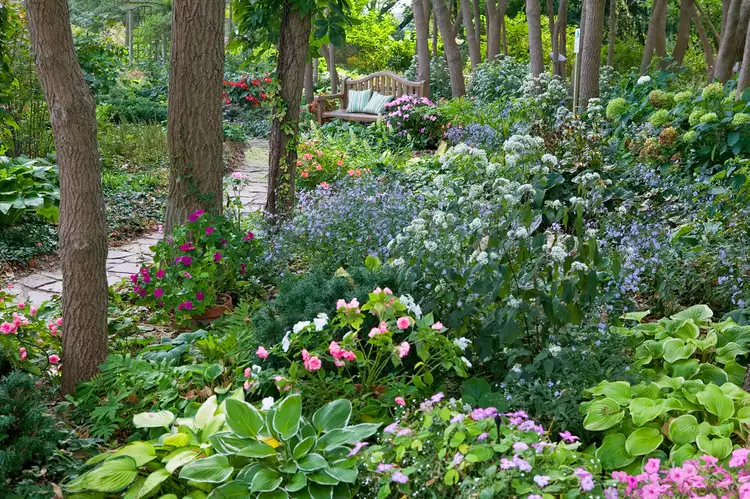Will Wildfire Smoke Harm Your Outdoor Plants?

In certain parts of the United States, people have been affected by wildfires and the resulting smoke for years, dealing with air quality warnings and orange, dusty skies on a semi-regular basis. But this year, wildfires burning in Canada have put other regions at risk, and apocalyptic-looking skies have prompted fresh questions for those unfamiliar with wildfires and their effects: Should I wear a mask outside? Can I leave my windows open? Do I need to clean my air filters?
Beyond the very important questions surrounding how wildfire smoke affects us, you may also be wondering about your garden, and any other plants you keep outdoors. Will wildfire smoke cause lasting damage to your greenery? We talked to horticulture experts, and the short answer is, luckily, not really.
“It’s one of those things that's really scary to us, but it is short term,” says Hillary Jufer, the horticulture program manager at Cornell University’s Cooperative Extension program. “So, just wear a mask when you’re outside, and your plants will do just fine.”
However, there are some things you can do to make sure your garden springs back quickly from any short-term stress that comes from ash and dust. Jufer, along with Anthony Garza, the horticulture and grounds supervisor at University of California Botanical Garden at Berkeley, shared some easy ways you can protect your garden before and after those ominous clouds of smoke roll through.
How to Help Outdoor Plants Thrive After They’re Exposed to Wildfire Smoke
Re-Hydrate Plants Post-Smoke
Incoming smoke and ash can put a lot of stress on your outdoor plants because smoke particles scatter light, allowing less to reach gardens directly. When plants receive less sunlight, their photosynthetic process is slowed, which prevents them from growing and thriving.
“The simplest thing one can do—whether this is potted plants or plants in the ground—is to make sure that things are well-hydrated during these episodes,” says Garza. “That extra heat and smoke can put stress on that plant—physiological stress.”
Though this impact is minimal, according to Jufer, it can still be a good idea to give your plants a little more water if they look dry—she suggests an inch of water per week, including rainfall. You should pay a bit more attention to container plants, though, as they may need a bit more water.
“With container plants, you might need more water for them, especially if the weather is really hot and dry,” says Jufer. “You might need to water them every day or twice a day, depending.”
However, if it has rained a lot recently or your plants look hydrated after the smoke has already dissipated, don’t overdo it. Overwatering puts extra stress on the plants, too.
Because the smoke comes from forest fires, Jufer says not to worry too much about the effects of plastics, chemicals, or acid rain on gardens. The biggest danger to the plants is, after all, the lack of sunlight they’re soaking in.
Give Your Garden a Rinse
If your outdoor plants have collected some dust or ash during a period of heavy smoke, feel free to give them some extra TLC by rinsing them off with a hose.
“Lessening the stress for your plants with the watering, with the washing down, is probably the most practical thing that most of us could manage,” says Garza.
Pay more attention to your more delicate plants—think herbs, vegetables, and flowers. This quick wash will ensure that your plants are clean, and will provide them with a bit more moisture as they bounce back from periods of high stress.
Keep an Extra Eye on Precious Plants
Looking to protect your precious plants, like fruits, vegetables, and flowering annuals? As a short-term solution, Garza suggests getting a hold of some floating row cover or a frost cloth to protect plants from gathering dust. Usually used to ward off insects and ice, these permeable, often budget-friendly covers can act as a quick fix for plants you want to keep especially sheltered.
Why is this just a short-term solution? According to Garza, though the coverings keep your garden clean, they may compound the already-low levels of sunlight that plants are exposed to. If kept on too long, this can further impact photosynthesis, adding to already high levels of stress.
Other Things to Consider
To counteract the lack of sunlight caused by the smoke, adding artificial light won’t hurt your plants, Garza says. Specifically in a greenhouse, or for indoor plants more affected by a change in sunlight, adding supplemental LEDs is a relatively cheap and easy way to ensure your garden is getting all the light it needs. You don’t need to bathe all your plants in light, though—Garza says that this tip mostly pertains to more precious, delicate plants.
You may be concerned, too, about a small yet vital part of your garden—pollinators. But luckily, according to Jufer, there’s no long-term harm to insects, either. Though they may disappear for a small period of time, they’ll come right back out when the smoke clears to visit your garden again.